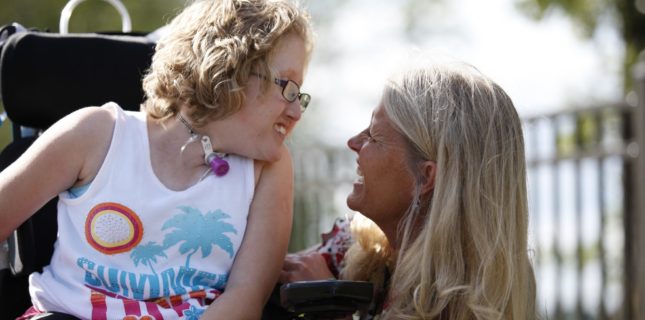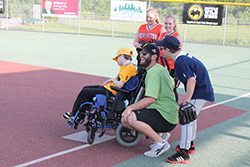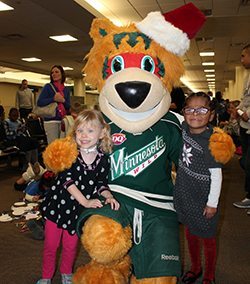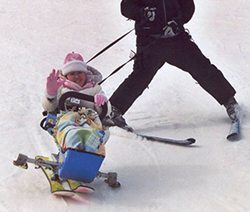Preparing for Successful Outings & Activities With Your Medically Complex Child

With accessible organizations, playgrounds, and technology making it even more possible for children with medical complexities and special considerations to do everything their peers do, there are so many opportunities to meet friends for a picnic, take the family to a baseball game, or head to the latest HopeKids event.
But as the parent of a child with complex medical needs knows, heading to an activity is not as easy as walking out the door – it takes planning, packing, organizing, and transporting.
“There is a lot of planning that goes into all of the adventures we go on,” says Jill, who is an infusion nurse at PHS also mom to Tana, who has medical complexities. “But it is all worth the effort – Tana does pretty much everything we do!”
With each child’s unique needs and personality, there are a number of factors to consider when trying to arrange an activity for your kiddo. We believe in taking care of the medical stuff so kids can be kids, and that means sharing how some parents have learned to prepare for successful activities and playdates with their child.
Do you have any additional tips or tricks? Share them with us so we can all learn from one another.
Find organizations that support activities specifically for families who have a child with unique needs.
A couple we work with are:
HopeKids provides events and activities that give children with medical complexities and their families a chance to take a break from their everyday life and enjoy time together while being surrounded by a like-minded community. We love them, and know many of our families love them too!
 Miracle League provides children ages 3-19 with mental and/or physical challenges an opportunity to play baseball as a team member in an organized league, regardless of ability. There are teams all across Minnesota!
Miracle League provides children ages 3-19 with mental and/or physical challenges an opportunity to play baseball as a team member in an organized league, regardless of ability. There are teams all across Minnesota!
Additionally, West Metro Miracle Athletics hosts iCANhoop, which is a league that was created to offer a basketball clinic to children with physical or cognitive impairments. They currently offer the clinic in Chanhassen, with sessions running for 6 weeks at a time.
If you’re looking for accessible playgrounds across the United States, National Public Radio has created a comprehensive database at PlaygroundsForEveryone.com.
Communicate with others involved
If you’re going on a picnic with a friend and her child, what are you envisioning? Will you be at a picnic table or on a blanket? Your expectations may be much different than the other parent’s, depending on their child’s needs. Although some parents might be uncomfortable directly communicating what is necessary to make this enjoyable for everyone, being upfront and open about your plan will help everyone to be on the same page.
“In group activities, it really helps to set expectations for other adults and children about the schedule and the fact that plans may change based on your child’s needs,” says Monica Handlos, Clinical Social Worker at PHS. “A complex child’s status can change quickly, and the most important piece to a successful get together is comfort and stability on everyone’s part.”
Be realistic about what will (and won’t) work for your kiddo
Molly knows that her daughter, Addyson, who has Trisomy 18, isn’t a huge fan of sunlight – so it’s likely that she would not enjoy an outing on a sunny afternoon.
 “If someone asked me if we wanted to go to a playground and it’s a sunny day, I know we will have to decline because realistically, it won’t be a successful outing,” Molly said. “Similarly, one of my first thoughts when we are thinking about going somewhere is what the schedule will be for Addyson. Figuring out what time is best, if I can feed her when we’re out, or if I should I feed her before.”
“If someone asked me if we wanted to go to a playground and it’s a sunny day, I know we will have to decline because realistically, it won’t be a successful outing,” Molly said. “Similarly, one of my first thoughts when we are thinking about going somewhere is what the schedule will be for Addyson. Figuring out what time is best, if I can feed her when we’re out, or if I should I feed her before.”
Consider your child’s reactions to loud sounds, temperature, and lighting, or what mobility level is necessary for an activity. Also remember that if something isn’t working, you don’t have to stay. And sometimes, maybe it’s worth trying a new activity to see how your child will respond – they may surprise you.
Adapt activities to meet your child’s needs
Whether they’re visiting the mountains or camping, Jill has figured out ways to make sure Tana is able to be involved in whatever the rest of the crew is doing. Just check out that photo of her skiing! A few tips Jill has collected over the years include:
 Softball games – Tana pitches and rides her wheelchair around the bases
Softball games – Tana pitches and rides her wheelchair around the bases- Pools/lakes – A cheap raft with backrest/arm rests lets Tana float and put her legs in the water while keeping the trach out
- Camping – By finding a camper with electricity, Tana could join
- Hiking – Tana could go hiking by finding a backpack that worked to carry her in along with her equipment
- Biking – An adaptive bike trailer that also transforms into a jogger lets us pull and push Tana
- Tana also now has a large, adaptive jogger and can go running with me
If you have any questions or would like to get in touch with Jill regarding adapting activities, you can feel free to email her at jlwall@pediatrichomeservice.com. She loves to connect with other families and encourage them to live life to the fullest with their children, extra accessories and all.
Host friends at your house
Germs can be a big concern for children with medical complexities, so it may bring peace of mind for parents to put together a playdate at their own house where they’re able to be in control of the activities and sanitation. You may already have games that work well for your child, or adaptations made for activities – a helpful step in successful play.
Handlos suggests having standing rules for entering and leaving the house, regardless of who it is or what they were doing.
“In the play therapy room, whether I am working with a child with medical complexities or not, the clients know they come in, use hand sanitizer, play, and use hand sanitizer before leaving,” she says. “Just being okay with asking for what you need from everybody, so everyone does it.”
Hosting your child’s friends at your house may also be a good opportunity to help them understand your child’s medical needs, and also brings the convenience of having all of their equipment close by without having to pack it up – a task in and of itself that can take time when preparing for an outing.
Originally published: September 19, 2016

